Grapple with Genesis Chapter 4's profound exploration of sibling rivalry, divine justice, and hope, unveiling the chilling repercussions of sin and God's mercy.
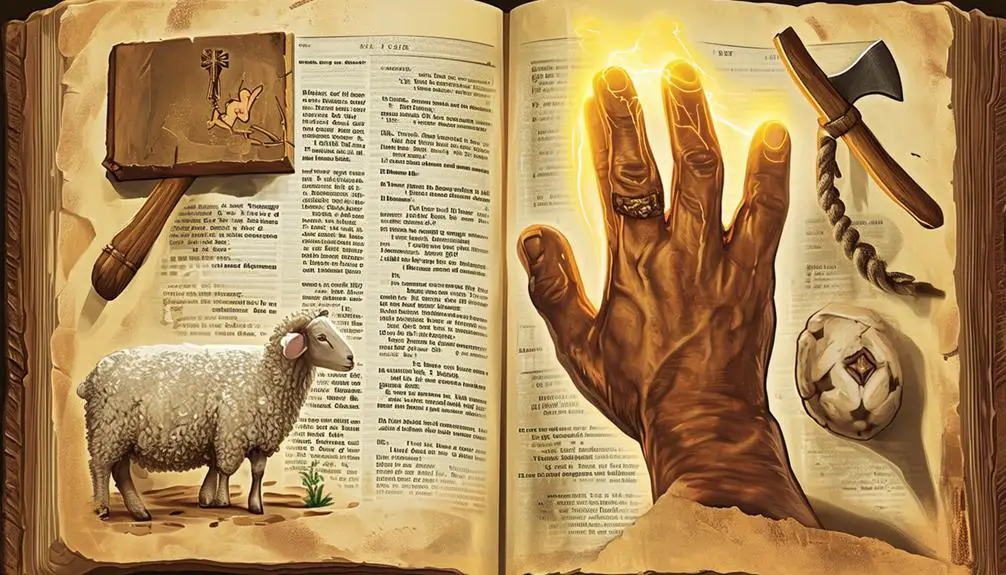
Bible Study – The Book of Genesis – Chapter 4 – Summary and Analysis
In Genesis Chapter 4, you explore the tragic tale of Cain and Abel, revealing stark contrasts of human behavior. You'll gain a clear understanding of sibling rivalry, driven by the disproportionate divine favor towards Abel's offering. Here, jealousy leads to the chilling first act of murder, ensuring you understand the gravity of sin's consequences. Simultaneously, you'll witness divine intervention, justice, and mercy through Cain's punishment. By the chapter's end, the birth of Seth signifies spiritual continuity, showcasing righteousness amidst despair. Moving forward will reveal profound revelations about human moral responsibility, sin repercussions, and God's interaction with humanity.
Key Takeaways
- Genesis Chapter 4 introduces sibling rivalry, leading to the first murder, illustrating the human condition post-Eden.
- The chapter explores the significance of sacrificial offerings and God's favor, which incites Cain's jealousy and results in Abel's death.
- God's punishment of Cain reveals divine justice and mercy, emphasizing the moral and theological implications of God's actions.
- Seth's birth symbolizes hope and spiritual continuity within Adam and Eve's lineage, contrasting with Cain's actions.
- The chapter provides timeless lessons on the consequences of sin, the importance of moral responsibility, and the coexistence of God's mercy and justice.
Genesis Chapter 4 Overview
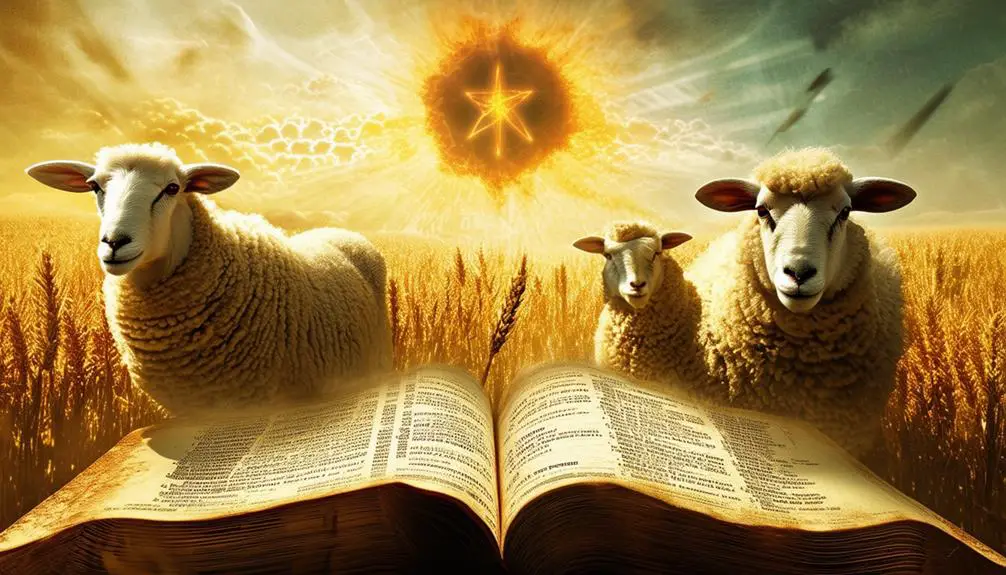
What can you recall of the fourth chapter in the Book of Genesis, where we're introduced to the first instances of birth, agriculture, music, and, sadly, murder? Let's explore the elements that shaped this pivotal chapter, specifically focusing on 'Sibling Rivalry' and the 'First Murder'.
This chapter introduces us to the first siblings, Cain and Abel. Their relationship epitomizes the quintessential sibling rivalry. Cain, the elder brother, is a tiller of the ground while Abel is a shepherd. They bring offerings to God, but God shows more favor to Abel's offerings, sparking jealousy and resentment in Cain.
This sibling rivalry escalates, leading to the first recorded murder in the Bible when Cain kills Abel. The murder isn't a spontaneous act of rage. It's premeditated, born out of Cain's deep-seated envy and resentment. This act of violence is not only a personal transgression but also a societal one, disrupting the harmony that existed in the world.
In essence, Genesis 4 presents a grim picture of the human condition post-Eden. It's a narrative of how unchecked emotions can lead to dire consequences, setting a sobering precedent for humanity's future.
Key Characters and Events
You'll first examine the story of Cain and Abel, scrutinizing the complexities of their relationship and the profound implications of their actions. Then, you'll interpret the nature and impact of God's punishment to Cain, considering its wider theological import. To conclude, you'll contemplate the birth of Seth, evaluating its significance within the broader narrative arc and theological framework of Genesis.
Cain and Abels Story
In the intriguing narrative of Cain and Abel, two central figures of Genesis Chapter 4, you'll find a tale steeped in sibling rivalry, sacrifice, and divine intervention that's critical to understanding the larger themes of the book. As the firstborn, Cain was a farmer who offered his crops as sacrificial offerings to God. Conversely, Abel, the second son, was a shepherd who offered the firstlings of his flock. This difference in offerings fundamentally illustrates the crux of their sibling rivalry. Abel's offering was found favourable by God, inciting Cain's jealousy and leading to the first recorded act of fratricide. This narrative not only explores the dynamics of sibling rivalry but also sets a precedent for the significance of sacrificial offerings in biblical texts.
Gods Punishment to Cain
Following Cain's act of fratricide, the narrative shifts to God's response, a series of divine punishments that further elucidate the gravity of Cain's actions. God's justice, in this particular situation, is swift and decisive yet laced with mercy. He marks Cain, not for further retribution, but as a sign of divine protection, paradoxically safeguarding the murderer from untimely death. This complex portrayal of Divine Justice underscores the nuanced nature of God's dealings with humanity. Your attention might then turn to Cain's Repentance, a pivotal turning point in his arc. Despite his crimes, Cain's remorse elicits God's mercy, underscoring the theme of redemption and grace that pervades the biblical narrative. This analysis of God's punishment of Cain illuminates the profound moral and theological implications of this seminal biblical episode.
Birth of Seth
After the tumultuous events surrounding Cain, the narrative shifts focus to the birth of Seth, a figure who, in his arrival, heralds a rejuvenation of hope and spiritual continuity for Adam and Eve's lineage. Seth's birth represents a fresh start, a chance for mankind to correct the mistakes of the past. It's through Seth, for example, that the line of righteous men, leading to Christ, emerges.
- Seth's Legacy: His line includes figures like Enoch, Noah, and Abraham. Seth's impact is hence felt across generations.
- Generational Impact: Seth's descendants live by faith, showing reverence to God.
- Seth as a figure of hope: Seth's birth renews hope in humanity after Cain's downfall.
- Seth's righteousness: Seth's life contrasts Cain's, showing the possibility of righteousness.
- Continuity: Seth secures the continuation of Adam and Eve's lineage, underlining the theme of God's faithfulness.
Detailed Verse-by-Verse Analysis
Delving into a detailed verse-by-verse analysis, you'll uncover the richness and depth of Genesis Chapter 4, revealing subtle nuances and profound insights. The concept of Divine Intervention is palpable from the start, where God, not being indifferent to human affairs, intervenes in the conflict between Cain and Abel. The Lord's engagement with Cain, post Abel's murder, is a vivid illustration of divine justice and mercy.
Analyzing verses 7-15, you'll see the interplay of Sin's Consequences. Despite Cain's blatant disobedience, God doesn't abandon him but marks him, not for further punishment, but for protection. This act, paradoxically, is both a curse and a blessing – a physical manifestation of divine intervention that acts as a severe warning and a protective sign.
In verses 16-24, we see Cain's descendants and the rise of civilization, presenting a complex picture of human progress shadowed by sin. The chapter ends with the birth of Seth, offering a glimpse of hope amid despair. This detailed analysis of Genesis 4 illuminates various angles of divine intervention and the profound implications of sin.
Major Themes Explored
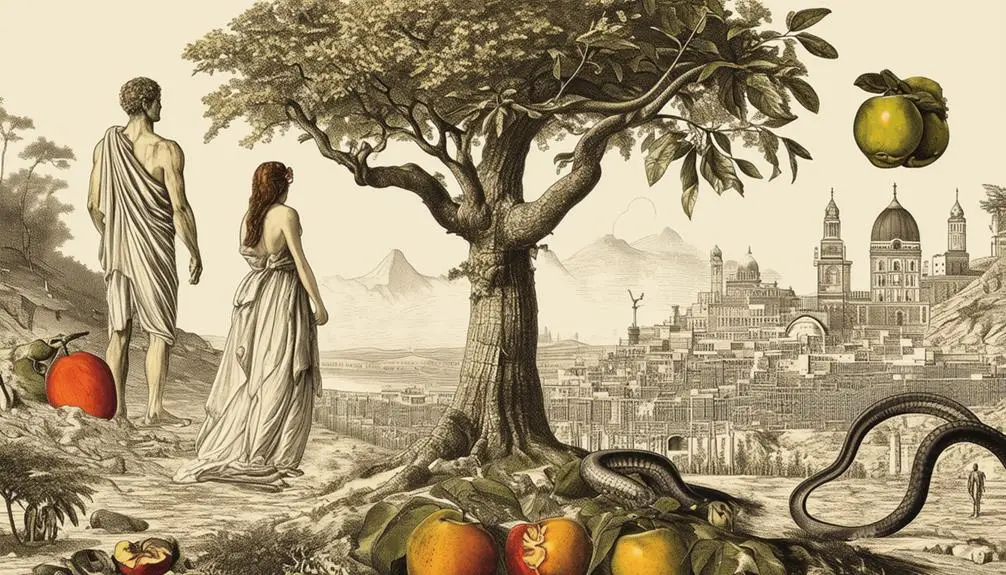
While you navigate through the labyrinth of theological symbolism in Genesis Chapter 4, you'll encounter several major themes that shed light on the human condition and the divine relationship. These themes range from Divine Intervention to the sinful nature of mankind, each bearing significant relevance to the understanding of this biblical narrative.
- Divine Intervention: God's active involvement in the affairs of man is a recurring theme. God intervenes, warning Cain about his sinful inclinations and providing him an opportunity for repentance.
- Sinful Nature: The narrative illustrates mankind's inherent propensity towards evil, exemplified in Cain's jealousy and subsequent murder of Abel.
- Mercy and Judgment: Despite Cain's transgressions, God shows mercy, protecting him from retaliation.
- Human Responsibility: Cain's response to God's query about Abel's whereabouts reveals the theme of human accountability.
- Consequences of Sin: The aftermath of Cain's actions, including his banishment, underscores the serious consequences of sin.
Through this study, you'll appreciate how Genesis 4 provides a profound exploration of the complex dynamics between divine intervention and human free will, the struggle with sinful nature, and the inevitable consequences of our actions.
Interpretations and Reflections
Now, you'll shift your focus to the interpretations and reflections of Genesis Chapter 4. You'll dissect the complex characters of Cain and Abel, their actions, motivations, and the subsequent divine punishment. This analysis will allow you to unravel the intricate layers of human nature, divine justice, and moral dilemmas presented in this biblical narrative.
Understanding Cain and Abel
In the heart of Genesis Chapter 4, you'll encounter the compelling narrative of Cain and Abel, a story that's been subjected to numerous interpretations and reflections over the centuries. This chapter elucidates the dynamics of sibling rivalry and parental favoritism, themes that still resonate today.
To deepen your understanding, consider these points:
- Cain and Abel represent the first instance of sibling rivalry, provoked by perceived parental favoritism.
- Their professions (Cain as a farmer, Abel as a shepherd) symbolize the struggle between agrarian and pastoral societies.
- Cain's offering being rejected by God, may suggest divine preference for pastoral life.
- Abel's death signifies the dire consequences of unchecked jealousy and anger.
- The story underscores the moral responsibility we have toward our siblings and fellow humans.
This chapter's lessons are universal, transcending time and cultures.
God's Punishment: Analysis
After examining the complexities of Cain and Abel's relationship, let's shift our focus to the analysis and reflection on God's punishment for Cain's actions. The concept of Divine Justice is clearly depicted in this narrative. God's punishment wasn't arbitrary; it was a direct response to Cain's sin. This underscores the biblical principle that Sin Consequences are inevitable. Cain's punishment was severe; banished from his homeland, he became a wanderer. This emphasizes the gravity of his actions, implying the seriousness of disobeying Divine Justice. Additionally, God's mark on Cain served as both a curse and a protection, showing God's complex role as both a judge and a protector. This punishment reflects the dual nature of Divine Justice — it's both retributive and protective.
Practical Lessons for Today

Drawing lessons from Genesis Chapter 4, you'll find that it's rife with timeless teachings that can be applied to modern life. This chapter, in particular, highlights the dire Sin Consequences we must face, as well as Divine Intervention's pivotal role in our lives.
To explore deeper, consider these practical lessons derived from the chapter:
- Sin has far-reaching consequences: As seen in Cain's punishment, our actions can indeed have long-lasting and profound impacts, affecting not just us but also our descendants.
- Divine Intervention is constant: God's intervention in Cain's life, despite his wrongdoing, demonstrates His continuous engagement with humanity.
- Personal responsibility is crucial: Cain's denial of his brother's murder underscores the importance of owning up to our misdeeds.
- God's mercy is all-encompassing: Despite Cain's crime, God still provides him protection, illustrating His boundless mercy.
- Human life is sacred: The punishment meted out for Abel's murder underscores the sanctity of human life.
In essence, these lessons from Genesis Chapter 4 remind us of the importance of moral and ethical conduct, the weight of our actions' consequences, and the constant presence of divine guidance in our lives.
Frequently Asked Questions
What Are the Different Interpretations of Genesis 4 Across Various Denominations?
You'll find varying interpretations of Genesis 4 across denominations. Some focus on Cain's motivation, viewing it as jealousy or rebellion against God. Others emphasize Abel's sacrifice, seeing it as a symbol of faith and obedience. It's also interpreted as a cautionary tale about sin's consequences. Remember, these interpretations aren't mutually exclusive, and many denominations consider multiple perspectives to gain a thorough understanding.
How Does Genesis 4 Connect to the Other Books in the Bible?
Ironically, you'll find Genesis 4 isn't an isolated tale. It's actually a precursor to themes echoed throughout the Bible. Genesis 4's symbolism, particularly Cain's legacy, sets the tone for the struggle between good and evil. Stories of sibling rivalry, sin, and redemption reoccur, reminding us of Cain's actions. It's a thread woven into the Bible's fabric, linking Genesis to other books and revealing an intricate narrative tapestry.
What Are Some Historical or Archaeological Evidences Supporting Events in Genesis 4?
You're asking about historical or archaeological evidence for Genesis 4. While direct evidence is scarce, Cain's occupation as a farmer and Abel's sacrifice of a lamb reflect early agricultural societies. Some artifacts, like ancient farming tools or remnants of animal sacrifices, might provide indirect support. Remember, archaeological findings can be interpreted differently, and what might affirm these events for one person might not for another.
How Have Views on Genesis 4 Changed Over Time?
Over time, your understanding of Genesis 4 may shift due to cultural influence and shifts in canonical perspective. You might interpret Cain and Abel's story differently, influenced by societal norms and values. Centuries ago, it was seen as a literal historical account, but today, you might view it as a metaphorical tale illustrating moral lessons. Remember, interpretation's fluidity reflects our evolving understanding of ancient texts.
What Are Some Controversies or Debates Related to the Interpretation of Genesis 4?
You've probably heard varied interpretations of Genesis 4. One key debate centers around Cain's motivation for killing Abel. Was it jealousy, or was it a deeper, moral issue? Abel's sacrifice is another controversy. Why was his sacrifice more pleasing to God than Cain's? These questions have stirred countless scholarly debates, with interpretations changing as societal norms evolve. It's a fascinating exploration of morality, faith, and human nature in ancient texts.

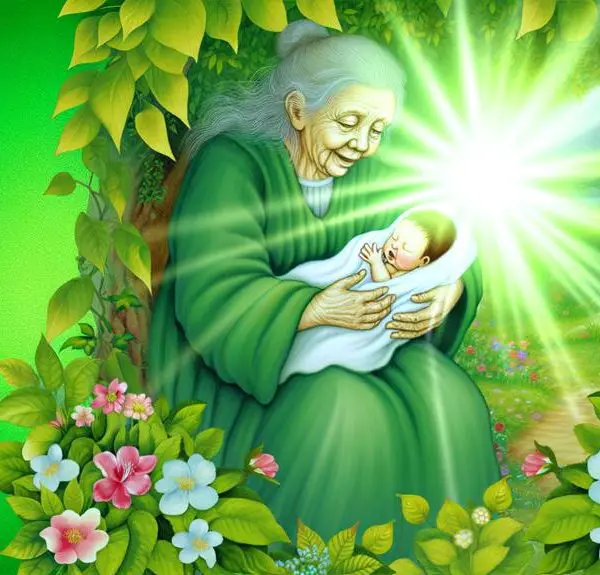
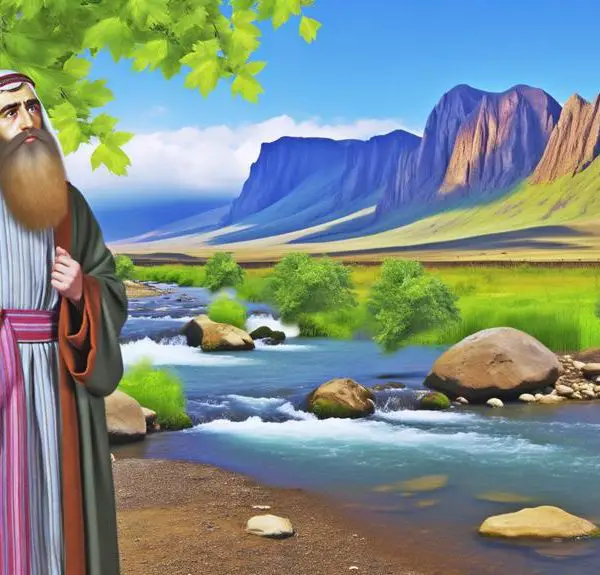
Sign up